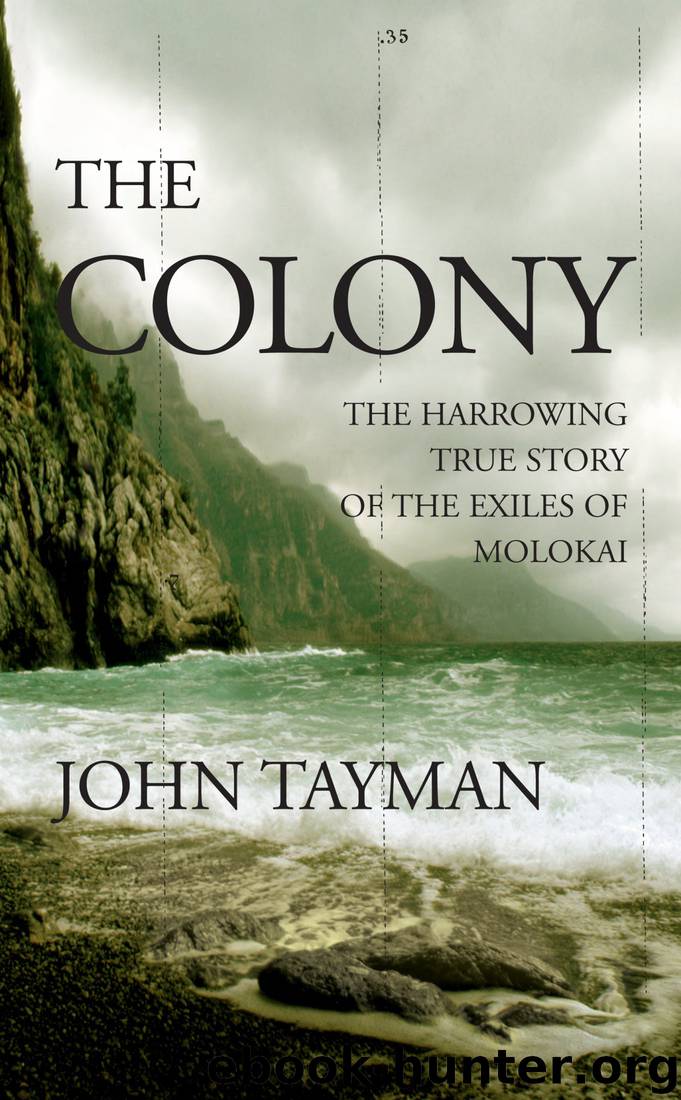The Colony by John Tayman

Author:John Tayman [Tayman, John]
Language: eng
Format: epub
Tags: Diseases & Physical Ailments, History, Infectious Diseases, Medicine & Health Sciences, United States
ISBN: 9780743233002
Google: 7SXEMMraz0kC
Amazon: 0743233018
Publisher: Scribner
Published: 2006-01-09T03:00:00+00:00
All a Man Holds Dear (Population 510)
Lawrence Judd’s memory of that morning remained crisp, despite the three decades that had passed. He had been eleven years old, pedaling his bicycle along the Honolulu esplanade. The wheels ticked on the planking, and Judd had been following along with the rhythm when a strange noise sounded. “A wail,” Judd would write, “trouble of some kind.” He hopped from his bike. An interisland cattle boat was tied at the end of the pier, screened by a white fence. Policemen ranked the fence, holding back a group of distressed men and women. The crowd “clung to the picket barrier, their bodies rocking, as they gave way to spasms of grief,” Judd wrote. Just then two guards began to escort a group of people past the audience.
Judd approached one of the uniformed men. “Who are they?” he asked.
The man replied, “Kalaupapa.
A health officer pulled patients from a canvas-sided van and steered them to the gangplank. Another officer, wearing dark gloves, took hold of each patient and towed him or her aboard. Judd noticed a woman emerge from the van, leading a small girl. “As these two appeared, the crowd, which had been momentarily silent, burst again into a long wail,” Judd wrote. “I wanted to cry myself, without knowing why.” The woman cleared tears from the girl’s eyes, then tucked her handkerchief into the child’s dress, but it fluttered to the ground. A guard hurried over with a sheet of newspaper, dropped the paper atop the handkerchief, crumbled them into a ball, and tossed both aside.
Again Judd asked, “Who are they?” The guard said that the people being taken aboard the ship had leprosy.
“But they look all right,” Judd insisted.
The guard answered, “You cannot always see.”
Lawrence Judd was one of nine children born to Albert Francis Judd, chief justice of the Hawaiian Supreme Court. In his years on the court, Albert Judd had ruled on many cases involving the disease. He had presided over the murderer Keanu’s trial, heard Dr. George Fitch’s libel complaint, and authored the 1884 decision that leprosy victims be treated “as criminals.” When Lawrence Judd raced home from the pier, he found Albert Judd sitting in the parlor, reading the Advertiser. Lawrence asked his father if he knew anything about the disease. “His brow knotted,” Lawrence later recalled. Then Albert had replied gravely, “Yes, I know a little about leprosy.” The judge explained to his son about Leviticus and the pariah status of the Molokai exiles, and then began to recount the Keanu case, and Dr. Eduard Arning’s experiment with the prisoner. “Father stopped suddenly,” Lawrence later wrote. “I had the idea that he felt he should not have talked so freely upon such a serious topic with a small boy. He picked up the newspaper. I was dismissed. The wailing of the bereaved at the pier was still in my ears.”
Justice Albert Judd died two years later, in May 1900. Lawrence was sent to the mainland to attend school at Hotchkiss, and then the University of Pennsylvania.
Download
This site does not store any files on its server. We only index and link to content provided by other sites. Please contact the content providers to delete copyright contents if any and email us, we'll remove relevant links or contents immediately.
| Anthropology | Archaeology |
| Philosophy | Politics & Government |
| Social Sciences | Sociology |
| Women's Studies |
Nudge - Improving Decisions about Health, Wealth, and Happiness by Thaler Sunstein(7689)
The Fire Next Time by James Baldwin(5421)
iGen by Jean M. Twenge(5403)
Adulting by Kelly Williams Brown(4561)
The Sports Rules Book by Human Kinetics(4377)
The Hacking of the American Mind by Robert H. Lustig(4363)
The Ethical Slut by Janet W. Hardy(4236)
Captivate by Vanessa Van Edwards(3835)
Mummy Knew by Lisa James(3680)
In a Sunburned Country by Bill Bryson(3528)
The Worm at the Core by Sheldon Solomon(3483)
Ants Among Elephants by Sujatha Gidla(3458)
The 48 laws of power by Robert Greene & Joost Elffers(3219)
Suicide: A Study in Sociology by Emile Durkheim(3009)
The Slow Fix: Solve Problems, Work Smarter, and Live Better In a World Addicted to Speed by Carl Honore(3001)
The Tipping Point by Malcolm Gladwell(2903)
Humans of New York by Brandon Stanton(2864)
Handbook of Forensic Sociology and Psychology by Stephen J. Morewitz & Mark L. Goldstein(2691)
The Happy Hooker by Xaviera Hollander(2682)
